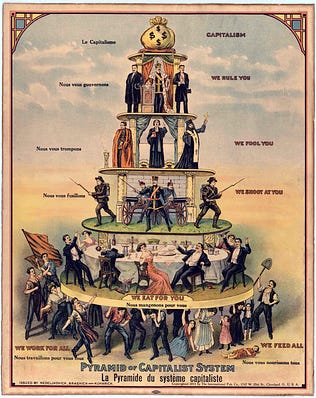This time of year reminds me of his anxious dependence on holiday sales (and in the days after Christmas, the frantic returns). Between Thanksgiving and Christmas, he needed to earn enough to pay the bills and have a sufficient sum to carry us through the first part of the following year.
We weren’t rich but never felt poor, and our standard of living rose steadily through the 1950s and 1960s — as factory workers and their spouses did better and better.
This was an era when the income of a single factory worker or schoolteacher or baker or salesman or mechanic was enough to buy a home, have two cars, and raise a family.
FOR THREE DECADES after World War II, America created the largest middle class the world had ever seen. During those years, the earnings of the typical American worker doubled, just as the size of the American economy doubled.
Over the last 40 years, by contrast, the size of the economy has more than doubled again, but the earnings of the typical American have barely budged (adjusted for inflation). Most of the gains have gone to the top.
In the 1950s and 1960s, the CEOs of large corporations earned an average of about 20 times the pay of their typical worker. Now they rake in over 300 times the pay of an average worker.
In the 1950s and 1960s, the richest 1 percent of Americans took home about 10 percent of the nation’s total income. Today they take home more than the bottom 90 percent put together.
Then, the economy generated hope. Hard work paid off. The living standards of most people improved through their working lives. Their children enjoyed better lives than they had. Most felt that the rules of the economic game were basically fair.
Although many women, Black people, and Latinos were still blocked from getting a fair share of the economy’s gains, the nation committed itself to changing this. New laws guaranteed equal opportunity, barred discrimination, promoted affirmative action, and expanded educational opportunity for all.
Today, confidence in the economic system has sharply declined. Its apparent arbitrariness and unfairness have undermined the public’s faith in it. Cynicism abounds. Equal opportunity is no longer high on the nation’s agenda.
As you’ll see in “The Big Picture” video on this page, recent American history can be divided into five periods:
1946-1979, we grew together. Almost everyone gained ground.
1980-2008, the great U-turn. Most economic gains began going to the top.
2008-2010, the financial crisis. The banks were bailed out but millions of Americans lost their jobs, homes, and savings. The experience revealed the gross inequalities of wealth and power that underlay the new economy. This caused widespread disillusionment with the system.
2010-2016, anger at the establishment. Both Bernie Sanders and Donald Trump emerged as anti-establishment candidates — although Trump’s anti-establishment persona was fake (and still is).
2016-2050, the choice between oligarchy and democracy. The 2024 election represented a lurch toward oligarchy, but I believe Trump and his oligarchy will overreach, and we’ll choose a more robust democracy.
***
WHEN MOST PEOPLE STOP BELIEVING that they and their children have a fair chance to make it, the tacit social contract begins to unravel. And a nation becomes susceptible to demagogues such as Donald Trump peddling the politics of hate.
Many of the most vocal proponents of the “free market” — including Elon Musk, executives of large corporations and their ubiquitous lawyers and lobbyists, denizens of Wall Street and their political lackeys, and numerous multimillionaires and billionaires — have been actively reorganizing the market for their own benefit.
The consequence has been a market created by those with great wealth for the purpose of further increasing their wealth.
This has resulted in ever-larger upward distributions inside the market, from the middle class, working class, and poor to a wealthy minority at the top.
Because these distributions occur inside the market, they have largely escaped notice. We tend to debate only downward “redistributions” that occur outside the market, through taxing the rich and transferring some benefits to the poor and working class.
Musk and Trump want to reduce such redistributions.
But the hidden upward redistributions inside the market are arguably larger.
This is why it’s so important that those of us who care about social justice speak out and explain what has happened. And why it’s crucial that Democrats focus on reversing the staggering inequalities of this era and getting big money out of politics.
Otherwise, the only explanation most Americans receive for what has happened comes from Trump authoritarians who falsely blame immigrants, “socialists,” the “deep state,” “woke”ism, Democrats, Black people, women, and other countries.
And the only agenda most Americans receive for remedying what has occurred is by backing Trump and Musk and their lurch toward fascism.
My friends, the underlying issue is not the size of government. It’s whom the government is for. The fundamental choice is democracy or oligarchy.

No comments:
Post a Comment